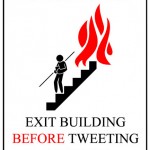 Failbook is a guilty pleasure of mine, offering as it does a steady stream of people doing stupid things online. A common source of mirth is people writing status updates at times when you would really think they’d have better things to do. Driving a car quickly is a common one, but it also seems that people often write an update immediately after some disaster (in a developed world sense of the word) or other has happened. The image to the right is a popular meme on this kind of situation.
Failbook is a guilty pleasure of mine, offering as it does a steady stream of people doing stupid things online. A common source of mirth is people writing status updates at times when you would really think they’d have better things to do. Driving a car quickly is a common one, but it also seems that people often write an update immediately after some disaster (in a developed world sense of the word) or other has happened. The image to the right is a popular meme on this kind of situation.
Whilst we may snigger at the need to share such events with the world, the emergency services here in Britain are relying on us thinking social media before anything else.
The London Fire Brigade has revealed that it is to consider letting people tweet about an emergency rather than the traditional route of dialling 999.
They previously have cautioned against such actions as their Twitter account isn’t monitored 24 hours a day, unlike the phone lines that people usually use. Nevertheless it wants to try new ways of engaging with the public.
“With over a billion people now using Facebook and half a billion using Twitter, it’s quite clear that social media is here to stay,” said Rita Dexter, deputy commissioner of the London Fire Brigade (LFB).
“The London Fire Brigade is the biggest fire service in the country and we think it’s important to look into ways to improve how we communicate with the public and how they can get in touch with us.”
Would you tweet about a fire?
Now personally speaking, if my building was on fire, or if I was witness to a fire, I’d still use the old school method of calling 999. With these things you want to be sure that a response will be forthcoming. I can certainly see the benefits of using social media to plot longer term events such as the spread of disease or an outbreak of rioting, where the lifecycle is much longer and you can plot trends. For something like a fire however, I’m inclined to think it warrants a more immediate response.
How accurate is a tweet?
The other issue that springs to mind is the accuracy of information. There have sadly been too many instances where people have tweeted misleading information. During the riots in London during the summer of 2011 for instance, many took to Twitter to find out what was happening, and whilst there was indeed some great information, there was also sadly a lot of misinformation. If you’re relying on this information to plan emergency responses it needs to be reliable.
I can certainly see how fire brigades could use Twitter successfully to promote good practice, provide official information and so on, but am less convinced that it can be used to actually find out about fires. This will be an experiment well worth following.
I would call 911 first then tweet. I actually came across a fire but the fire trucks were there and did tweet about as it was a popular restaurant locally. Loved that image – Exit first!
I was across the street from a building that was on fire. Oddly enough, I was at a cafe for a social media tweetup. We called 911, to find out that they had already been called. Then we tweeted the event and posted photos. This was the first time someone I knew was contacted via twitter in real time from a newspaper asking for permission to use the photos, and for more photos.
I'm with Lisa on this one – 911 first; tweet later.
It might be quite a bit later depending on how serious it was. Generally if my house is about to burn down or I'm in a fire ready to get nice and toasty; twitter would be the last thing on my mind.